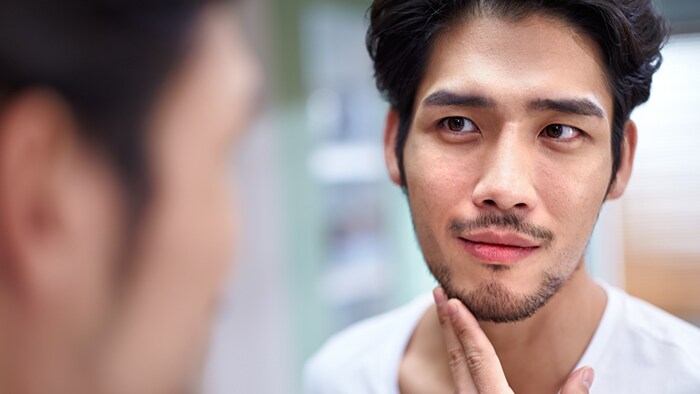The short answer is “no”. The slightly longer answer is that, while a significant proportion of people who get breakouts also have oily skin, it can’t be said that the two have a cause and effect relationship. After all, people with dry skin can also get breakouts, so it’s not the case that oily skin and breakouts are two sides of the same coin. Genetics and your skincare routine both have a part to play. It isn’t always easy to know whether you even have an oily skin type in the first place, and whilst a dermatologist or trained beauticians should be able to tell you, there are also signs you can look out for yourself. The most obvious sign being that if you wash your face in the morning, go about your day without any real physical activity, and you find that your skin has a sheen or slight stickiness in the evening, you probably do have an oily skin type. Be aware though, your entire face isn’t necessarily the same, and some areas may be more oily or more dry than others. Pay particular attention to the “T zone” were your brow meets your nose, as this is often a problematic area for those with oily skin. If you do have oily skin, the most important thing is not to get worked up or worried by it. It’s just a naturally occurring skin type, it’s not a deficiency or an illness or a condition, it’s as natural as breathing. In fact, given your body produces oil to seal in moisture and keep out bacteria, the oily skin type has a lot of advantages. The second most important thing to know is that going wild with the face soap and trying to dry your skin out isn’t going to help. Your skin will just ramp up the oil production to compensate, and you’ll make matters worse for yourself. The oil benefits your skin by keeping it hydrated, that’s why your body produces it, so the goal is to limit excess production and not eliminate it entirely. On a biological level a spot or zit is a blocked pore, and as your skin’s natural oil comes out of your pores, having more oil does therefore give more opportunities for a blockage to occur. While anybody can get a blackhead or a whitehead, breakouts as a condition is often bilogical, and if you’re predisposed to getting it then it can be hard to eliminate the risk entirely. Your best defence is a regular and consistent skincare routine, using products formulated for oily skin. You can find details of a quick and easy routine elsewhere in this app, and keep in mind that people with an oily skin type shouldn’t use it as a reason to skip using moisturiser! Beyond that, there are some additional steps you can take to minimise the risk of breakouts developing, because bacteria are also a contributor to pores becoming blocked and zits developing. Your bedding, as lovely and comfortable as we’re sure it is, absorbs dirt, sweat and oil from your body while you sleep, and your bath towel readily picks up dead skin cells and leftover dirt from your body. Washing these kinds of items regularly stops the accumulated dirt being transferred back onto your body. It’s also commonly said that an office keyboard is as germ-infested as a toilet seat (coins and door handles are often not great either), and your hands are the vessel that carries the bacteria onto your face and into your pores. In an ideal world you could reduce this germ-transfer risk by just not touching your face, but in this world inhabited by actual people who do inevitably touch or scratch their face from time-to-time, frequent handwashing is a close second in terms or solutions. To sum up, having an oily skin type doesn’t necessarily mean that you’ll get breakouts, but it doesn’t make you immune either, and your genes play a big role. Having said that, using products designed to complement your skin type, being consistent with your skincare routine, and just having general good hygiene will all help. And lastly, just love the skin you’re in, because it’s impossible to change it. There are plenty of people out there who’ll envy your skin type, and having drier skin doesn’t make them any less likely to get breakouts, so don’t let anxiety about your skin stop you from living your best life.
-
![So you have oily skin, what now?]()
So you have oily skin, what now?
Read the article -
![No-nonsense, 10 minute skincare routine for men]()
No-nonsense, 10 minute skincare routine for men
Read the article -
![Why we get fine lines and wrinkles?]()
Why we get fine lines and wrinkles?
Read the article




